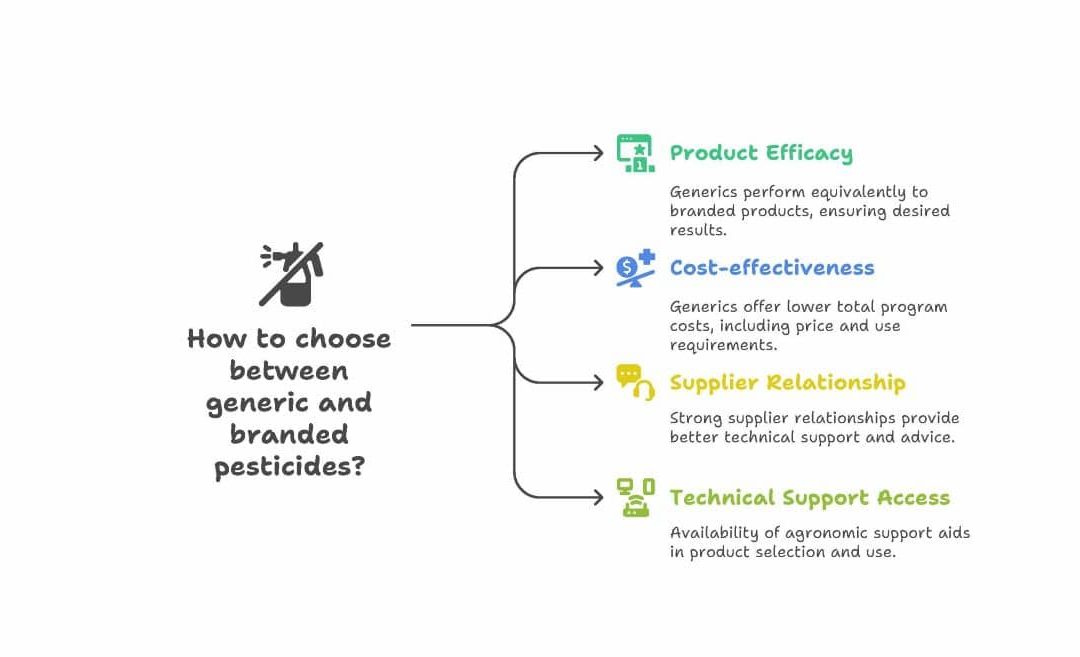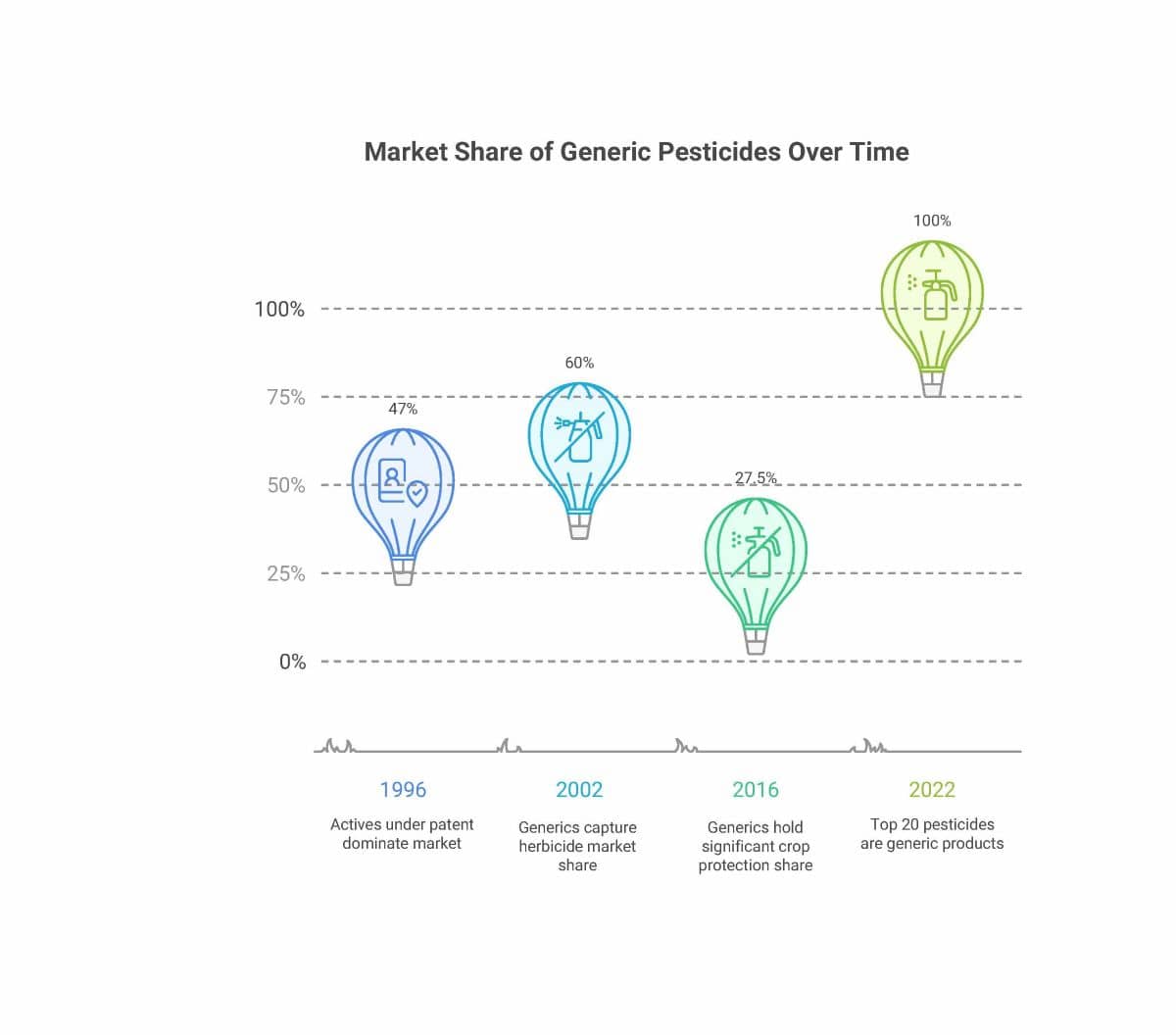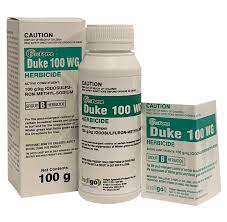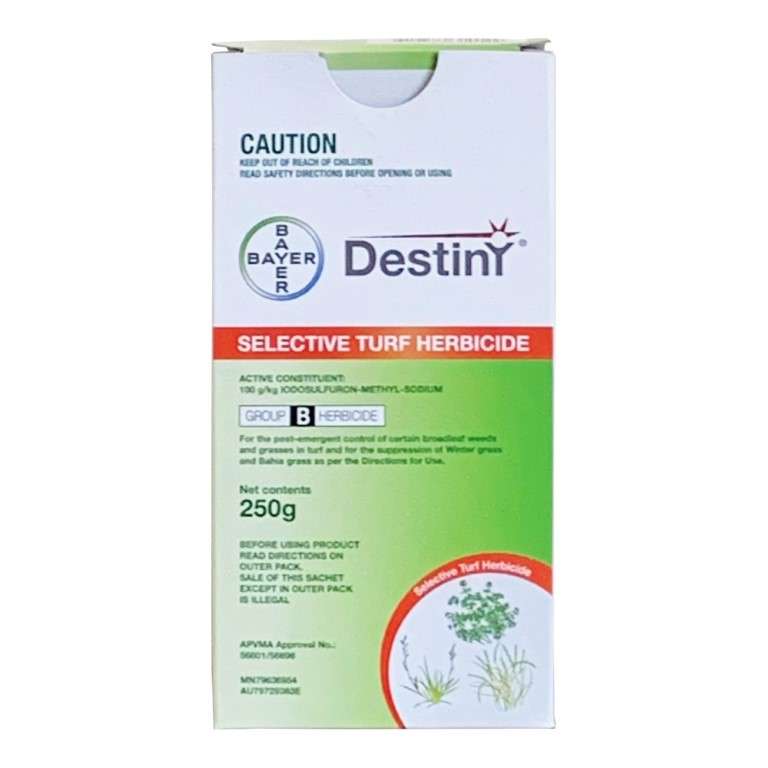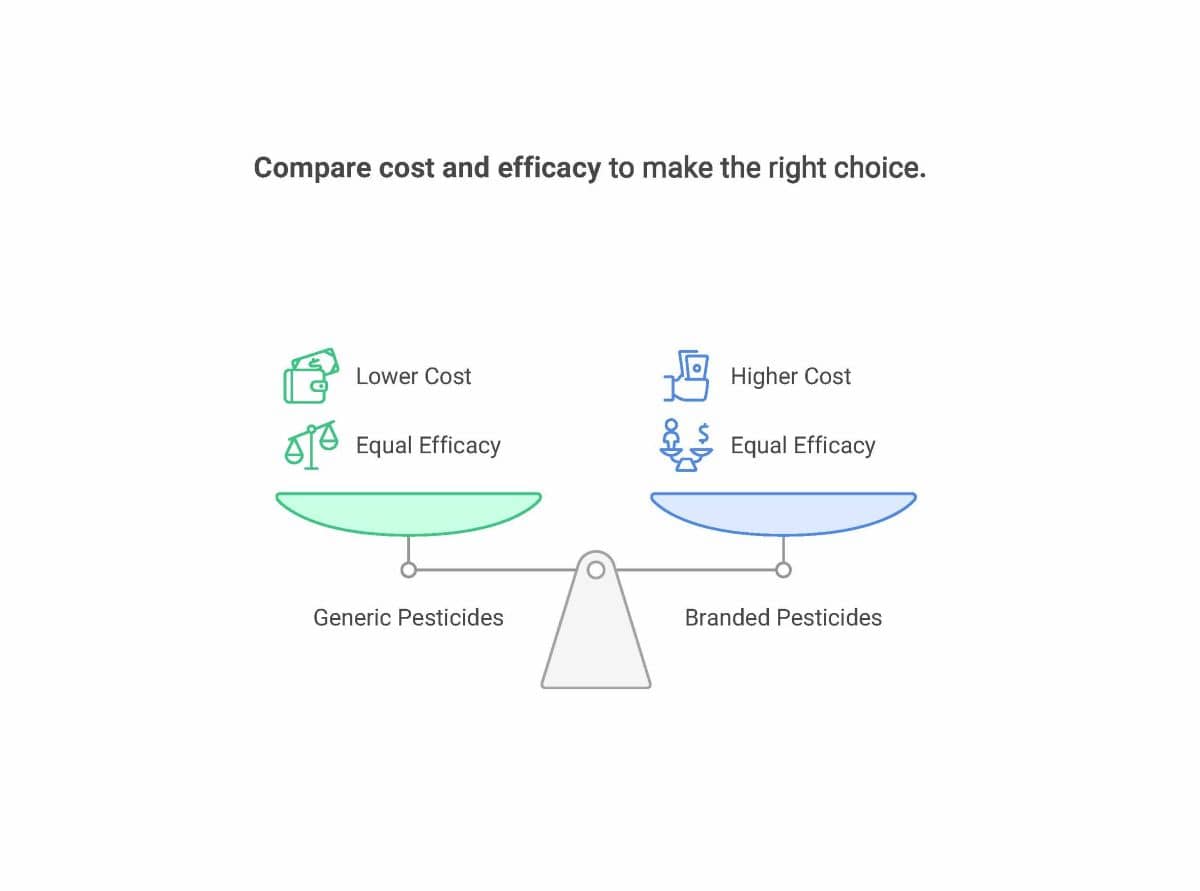Generic Pesticides vs Branded Products: The Complete Guide for Turf Managers.
The choice between generic vs name brands has become more important for turf managers. Generic pesticides have become increasingly common in the market due to budget constraints and the rise in costs.
This blog explains how in the battle of generic vs name brand products, generics can deliver the same results as brands at a lower cost. By doing this they can help you maintain your turf and keep control of your expenses.
Just like a choice between brand-name Aspirin and a generic alternative, turf managers face similar choices every day. For example many use generic Roundup products because “it’s the same stuff but costs less.”
But do generic pesticides perform as well as their name brand counterparts?
What Are Generic Pesticides?
Generics are turf chemicals made by companies other than the original patent holder. The definition of a generic manufacturer is:
“a company, or division of a company, whose main activity consists of the manufacture of pesticide actives, the patents for which have expired, and for which it did not hold the original patents.”
How Patent Expiry Creates Opportunities For Generics.
The growth of generic pesticides directly relates to the expiry of an existing patent.
In the patent period, only the original developer can produce and market the chemical. Once the patent expires, any company can then make the chemical and market it. This then creates opportunities for generics to enter the market.
Key Characteristics of Generic Pesticides.
Generics must contain the same actives as the original products. However, they may differ in:
- Inactive ingredients. These can include the solvents, stabilisers, and emulsifiers that are in its formulation.
- The physical form of the active.
- How it is made.
- How it is packaged and branded.
Comparison of Original Product vs Generic Product (Stajszczak A., (2012). | ||
Characteristics | Original product | Generic product |
Producer | A companies R&D develops a new substance | One of many generic companies |
Active | Research team’s results | Reproduced on the basis of the original product |
Patent | Product is under patent | Product is developed once the patent expires |
Product Lifespan | Produced in the patent period | Produced after the expiry of the patent |
Price | Depends on the stage of life cycle of the product, all price strategies applicable | Lower |
Distribution | Push and pull | Push |
Marketing Costs | High | Limited or none |
The Rise of Generic Pesticides in Turf Management.
The generic market has seen dramatic growth over the past three decades:
Market Evolution Timeline:
- 1996: Actives under patent made up 47% of the global agrochemical market.
- 2002: Generic pesticides captured 60% of the total global herbicide market2Ryan. P., The impact of generic herbicides on crop protection. February 2002. Pesticide Outlook 13(1):35-39.
- 2016: Estimates are that generics held 25 to 30% of the total crop protection market.
- 2022: The top 20 pesticides in the world are generic products.
In 2018, this growth led major players like BASF to consider entering the generic market. More than 100 agrochemicals went off-patent before 2023, which represents a value of US $11.0 billion.
Why Turf Managers Choose Generic Pesticides.
The main driver to use generics is their lower cost. Generic manufacturers don’t have to bear the development costs of the original research. This allows them to offer their products at much lower prices than branded options.
A 2006 USA Golfdom survey showed that about two-thirds of turf managers use generics. One-third spent half their chemical budget on generics, citing cost as the main reason for this.
Generic Pesticides Registration and Safety,
Regulatory Requirements Ensure Quality.
Generics must meet the same rigorous standards as brand products. The registration process includes thorough testing to ensure that any products are suitable for use.
This also ensures that when you use them as per their label directions, that they provide product warranties.
Key Registration Requirements:
- They are made with the same technical material as the brand product.
- They must have the equivalent performance to current brand products.
- The registered product must have the same active ingredient at the same concentrations.
- Often, the same companies manufacture both generic and brand versions of identical products.
Quality Assurance Through Testing.
The price of registered turf chemicals includes extensive testing and the registration costs. This ensures the product quality and its efficacy. The rigorous testing means that generics perform the same as branded products when you use them as directed.
Performance: Do Generic Pesticides Work as Well?
The simple answer for Australia is yes. Research has consistently shown that generic pesticides deliver equivalent results to branded products when they are properly formulated and used.
Evidence In Support Of Generic Pesticides.
- Gannon and Yelverton Research3Gannon, T. W.; Yelverton, F. H. 2007. Proceedings of the Sixty-First Annual Meeting of the Northeastern Weed Science Society. 61: p. 47.: A comparison of generic versus name-brand plant growth regulators and herbicides. They looked at cost, efficacy, and formulation of generic oxadiazon, quinclorac, and trinexapac ethyl. Their conclusion: no difference exists between generic and name-brand products.
- Landschoot and Fidanza. 20084Landschoot, P and Fidanza, M. 2008. Comparison of Chlorothalonil, Propiconazole, and Iprodione Products for Control of Dollar Spot and Brown Patch Diseases. USGA Turfgrass and Environmental Research Summary . No differences among propiconazole containing products were seen with respect to dollar spot control.
- Kaminski and Lulis Study5Kaminski, J.E., and T. Lulis. 2010. Comparison of various chlorothalonil products for the suppression of dollar spot on a research putting green, 2010.: Evaluated various chlorothalonil products. They found that all treatments provided equal control of dollar spot. This was regardless of whether they are generic or branded formulations.
- Popko, Campbell-Nelson and Jung. 20116Popko J, Campbell-Nelson K and Jung. G. 2011. NERTF Funded Project: Field efficacy testing of off-patent fungicide products for turf diseases. Department of Plant, Soil and Insect Sciences University of Massachusetts, Amherst, MA 01003 .
- Foundation for Arable Research. 2011 Work in NZ on trinexapac-ethyl showed no differences in performance between generic products.
- 2017 Industry Analysis: Showed that turf managers can achieve the same level of weed control for less cost with the use of generics.
Table of Generics vs Branded Pesticides | ||
Active | Branded product | Generic product |
Chlorothalonil | Daconil | Squadron |
Glyphosate | Roundup | Rapid Fire |
Imidacloprid | Merit | Recruit |
Iodosulfuron | Destiny | Duke |
Iprodione | Rovral | Voltar |
Pendimethalin | Stomp | Battalia |
Propiconazole | Banner | Regiment |
Trifloxysulfuron | Monument | Recondo |
Factors That Affect Generic Performance.
- Active: Generics contain the same actives as brands. This ensures that they have the equivalent biological activity and performance.
- Inactive Ingredient Variations: While the actives remain identical, inactive ingredients may differ between generics and brand products. These variations can affect how the product handles, mixes, or how you use it rather than its biological performance.
- Physical Form: Some generics may use different salt forms of the same active. For example, glyphosate generics may contain potassium, di-ammonium, or mono-ammonium salts. This is despite studies showing only minor performance differences between these formulations.
Popular Generic Pesticides for Turf.
Several products now have proven track records in the turf industry:
Established Generics.
Chlorothalonil: There are several of these on the market such as Squadron Weather Ace. These generic fungicides show consistent performance for turf disease control.
Sulfonylureas: Products like Duke and Recondo herbicides. These give effective weed control at a lower cost in comparison to branded alternatives.
Iprodione Fungicides: Voltar 500 and similar generic formulations give reliable disease prevention and control.
Granular Pre-emergents: Products like Onset 10GR give season-long weed control in an easy to use granular formulation.
Innovation in Generic Combinations.
Generic producers have developed sophisticated combination products that blend several actives:
- Fertiliser + herbicide + insecticide combinations.
- Multi-active fungicide formulations.
- Nutrient and chemical blends.
Products like Echelon Duo maintain efficacy standards, and offer convenience and cost savings.
Cost Analysis: Generic vs Name Brand Pesticides.
Why the Price Difference?
Generic producers have lower prices for several reasons:
- They do not need to claw back the cost of any research and development.
- They have lower marketing costs.
- There are usually multiple generic manufacturers in the market. This means that they are under competitive price pressure.
- They have established supply chains for the actives.
When Branded Products May Justify Higher Costs
Despite cost advantages, branded products may offer value in specific situations:
- Better Formulations: The original manufacturers often develop better formulations of chemicals as they come off-patent. For example, Banner Maxx is Syngenta’s enhanced formulation of Propiconazole.
- Great Product Support: Branded manufacturers tend to provide extensive technical support, training, and agronomic guidance.
- New Technology: Brand manufacturers invest in the development of new actives and formulations. These tend to not be available in the generic form.
- Market Response Strategies: Original manufacturers may reduce the price of brand products when generics enter the market. This is what occurred when Imidacloprid came off patent.
How To Choose Between Generic Pesticides and Branded Products?
Decision-Making Framework
To choose between generics and brand products means that you need to evaluate four key factors:
1. Product Efficacy: Does the product give the results you want? Research demonstrates that generics perform equivalently to brand products.
2. Cost-effectiveness: Calculate the total program cost. This includes the product price, its use requirements, and any differences in performance.
3. Supplier Relationship: Evaluate the technical support, and quality of any advice that your supplier gives you.
4. Technical Support Access: Assess the availability of qualified agronomic support to help with any product selection and use.
Supplier Evaluation Criteria
Qualified Technical Support: Whether you buy generic pesticides or brands, work with suppliers that offer a high-level agronomic support.
Product Knowledge: Suppliers should provide detailed technical support about products, their use requirements, and their performance.
Reputation: Choose suppliers with a proven track record, and with positive feedback from other turf managers.
Education Opportunities: Value suppliers that offer seminars, and product education.
Best Practices for the Use of Generic Pesticides
Application Guidelines.
Follow The Label: Generics require the same attention to the use directions as brand products. This makes sure that you get the best possible results.
Account For Formulation Differences: While their actives may be identical, different inactive ingredients may affect how a product mixes, handles or is used.
Monitor The Results: Track your results when you switch to generics. This makes sure that they meet your performance expectations.
Professional Support.
If you work with qualified agronomists it means that you use the right product and use it properly. Professional support becomes even more valuable when you use generic pesticides. Even small changes in the formulation may need that you have to make changes to how you use these products.
Maintain Industry Standards: Professional support helps you maintain consistent turf quality. It also helps you to optimise your product costs by your choice of generic pesticide.
Technical Guidance: Qualified dealers should provide ongoing support to help solve problems and optimise your programs.
The Future of Generic Pesticides in Turf Management.
Industry Trends.
Patent Expirations: More actives will continue to come off patent. This will increase the range of generics available to turf managers.
Generic Innovations: Generic producers are continuing to develop better formulations and combination products. This means that they do not rely solely on basic generic formulations.
Market Consolidation: Large companies that enter the generic market may lead a drive toward improved quality and support services.
Opportunities for Turf Managers.
Greater Product Choices: As the availability of generics increases it means turf managers have more economic choices without a loss in performance.
Technology Access: As patents expire, what was previously expensive technology will become more accessible due to the generics coming onto the market.
Budget Optimization: The strategic use of generics means turf managers can reassign their budget to other areas that they may need to improve.
Making Smart Generic Pesticide Decisions.
Generics offer viable choices for cost savings without any drop in performance. The key to this is to work with qualified suppliers who can provide the best level of technical and product support.
Success Factors:
- Choose suppliers who offer strong technical support.
- Verify proper registration and quality standards.
- Monitor results when you move toward the use of generics.
- Maintain relationships with qualified agronomists.
Bottom Line: Generics can deliver the same performance to brands at lower costs. However, their success needs careful supplier selection and professional guidance.
Generic pesticides are a viable solution for turf managers who want to to optimise their chemical programs and maintain quality standards. However, this needs to be done hand in hand with qualified professional support.
Which generics have the best track record?
Chlorothalonil, Iodosulfuron, and Iprodione-based generics have proven performance when use for turf management situations. Other actives include:
- 2,4-D: One of the most reliable and widely-used generic herbicides. It is typically 70-80% less expensive than branded equivalents.
- Quinclorac.
- Glyphosate.
What should I look for in a generic pesticide supplier?
You should prioritize suppliers that offer qualified technical support, have reliable supply chains, and that have positive industry references.
- Field Performance Data.
-
- Ask for efficacy data that compares their products to branded equivalents.
- Look for University or independent research that validates their performance.
- Ask for customer testimonials.
- Verify that they conduct their own field trials.
- Technical Support.
- Ensure that they have qualified agronomists or technical specialists on their staff.
- Verify they they can provide use recommendations and troubleshoot if necessary.
- Confirm that they offer tank mix compatibility guidelines.
-
Evaluation Process.
- Ask for product samples and technical data sheets.
- If you are not sure about a product carry out small-scale trials before any large purchases.
- Verify any references.
- At first start with less critical areas to build confidence.
- Monitor the results closely during initial use.
- Maintain relationships with qualified suppliers
Are generic pesticides as effective as branded ones?
Yes. In Australia generic pesticides deliver the equivalent performance to branded products. This is because they contain identical active ingredients at the same concentrations.
Where Generics Excel.
- Generics excel with mature chemistries with well-established formulation science.
- With simple actives like 2,4-D, glyphosate, or propiconazole.
- With post-patent products where the formulation knowledge is widely available.
- In high-volume applications where the cost savings become significant.
Potential Limitations.
- Complex formulations can have subtle differences in their inert ingredients.
- New generics from untested manufacturers may have variable quality.
- Their tank-mix compatibility might differ slightly between formulations.
- The application characteristics (droplet size, coverage) may vary.
How much can I save with generic pesticides?
Any savings that you get will vary by product and supplier. Based on industry data and research, generic pesticides typically offer savings of 50 to 90% in comparison to branded products.
Typical Savings Range.
Most industry sources indicate that generic pesticides cost:
- 50 to 70% less for common herbicides like 2,4-D and glyphosate.
- 60 to 80% less for mature fungicides and insecticides.
- 40 to 60% less for newer chemistries with a recent patent expiration.
Hidden Savings
- Lower inventory costs due to lower product values.
- Lower insurance premiums on lower value chemical inventory.
- Freight savings when you buy in larger volumes due to lower unit costs.
Potential Additional Costs
- Increased due diligence spent on supplier evaluation.
- Testing costs for product performance validation.
- Potential re-treatment costs if products underperform (this is rare with quality generics).
References

Jerry Spencer
Jerry has an Hons Degree in Soil Science (1988) from Newcastle Upon Tyne University. He then worked as a turf agronomist for the Sports Turf Research Institute (STRI) until 1993.
He gained a Grad Dip in Business Management from UTS in 1999. He has held a number of technical roles for companies such as Arthur Yates (Commercial Technical Manager) and Paton Fertilizers (Organic, turf specialty and controlled release fertiliser) portfolios.
In 2013 he established Gilba Solutions as independent sports turf consultants and turf agronomists. Jerry has written over 100 articles and two books on a wide range of topics such as Turf Pesticides and turfgrass Nutrition which have been published in Australia and overseas.

